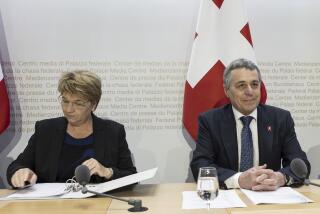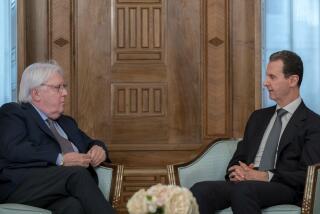Arab League Unlikely to Embrace Iraq at Meeting
- Share via
CAIRO — In a potential turning point in Iraq’s relations with its neighbors, the Iraqi foreign minister will address the largest gathering of Arab foreign ministers in eight years today and ask for a united Arab stance to lift sanctions and condemn U.S. airstrikes.
However, Mohammed Said Sahaf will face an uphill battle at the Arab League “consultative” meeting. Saudi Arabia and Kuwait still feel bruised by Iraqi President Saddam Hussein’s 1990 occupation of Kuwait, and Hussein’s recent comments urging the overthrow of governments that support U.S. policy has only added to their unease with the Iraqi regime.
All Arab countries have said they want to see at least an easing of the sanctions that have inflicted suffering on the Iraqi people. Yet many remain leery of Hussein, and they do not want any relaxation of sanctions to result in material benefit or a moral victory for his regime.
Iraq already seems to have suffered one defeat: During a series of intensive consultations leading up to the meeting, a call to convene a full summit of Arab leaders on Iraq was apparently put on ice.
The foreign ministers’ meeting originally was intended to pave the way for such a summit, but the league’s secretary-general said in a published interview Friday that the idea of a summit probably will not be discussed because of objections by Saudi Arabia.
Arab League Secretary-General Ahmad Esmat Abdel Meguid said Saudi Arabia has already stated that it will not participate in any summit attended by Hussein.
Instead, today’s meeting is expected to produce a “balanced” statement that will include criticism of the U.S.-British airstrikes in December and oppose the continuation of sanctions in their current form. The statement also is expected to call on Iraq to confirm its recognition of Kuwait’s borders and to pledge good relations with it and with other Gulf states, and to respect U.N. Security Council resolutions.
The pan-Arab daily newspaper Al Hayat said a draft resolution prepared for the meeting asks U.N. Secretary-General Kofi Annan to seek an outcome that will eliminate both Iraq’s weapons of mass destruction and the sanctions that have been imposed.
Sixteen Arab foreign ministers, plus lower-ranked representatives from four other Arab League member states, have confirmed they will attend the meeting.
Abdel Meguid said it will be the largest such gathering of Arab foreign ministers since 1990.
Interviewed by Al Hayat, Abdel Meguid said Arab ministers realize the difficulty in finding a consensus on the divisive issue of Iraq.
“The Arab ministers are perfectly aware of the problems standing in the way of common Arab action,” he said, with the meeting being “a good chance to talk in all honesty and objectivity about ways to get out of this crisis.”
Sahaf has attended several of the twice-yearly Arab League foreign ministers’ meetings in recent years.
However, Iraq has not been allowed to attend a full summit of Arab leaders since the Persian Gulf War. Baghdad had hoped that today’s meeting would open the door to such a gathering, which would symbolically represent Iraq’s readmission to the Arab fold.
It is apparently not to be.
According to Egypt’s semiofficial newspaper Al Ahram, “The general feeling among Arabs is that the time is not suitable for an Arab summit, and there is no room for the Iraqi president to attend such a summit after his recent statements urging Arab masses to revolt against their rulers.”
On Thursday, Sahaf accused the United States of manipulating its allies in the region to come up with a resolution that would not be detrimental to U.S. interests.
“Whether a minority or a majority . . . go along with the hostile American position against Iraq, we will refute it, condemn it and consider it from the beginning to be completely rejected,” he told a Baghdad news conference before his departure.
Sahaf’s accusations of U.S. manipulation raised the hackles of Abdel Meguid, who responded in Al Hayat: “We do not carry out instructions from anyone, and we put the interests of the Arab nation above everything.”
Iraq’s representative to the Arab League, Sultan Shawi, said Iraq’s proposed draft for the meeting will denounce the recent U.S.-British airstrikes, demand the immediate elimination of all economic sanctions and of the “no-fly” zones in northern and southern Iraq, and seek compensation for the damages Iraq has suffered. It also will accuse the U.S. of applying a double standard when it comes to Iraq, and it will call for the elimination of all weapons of mass destruction from the Middle East.
Shawi said Iraq will have no problem confirming its recognition of Kuwait.
“We have always accepted Kuwait and accepted the borders of Kuwait,” he said.
More to Read
Sign up for Essential California
The most important California stories and recommendations in your inbox every morning.
You may occasionally receive promotional content from the Los Angeles Times.













